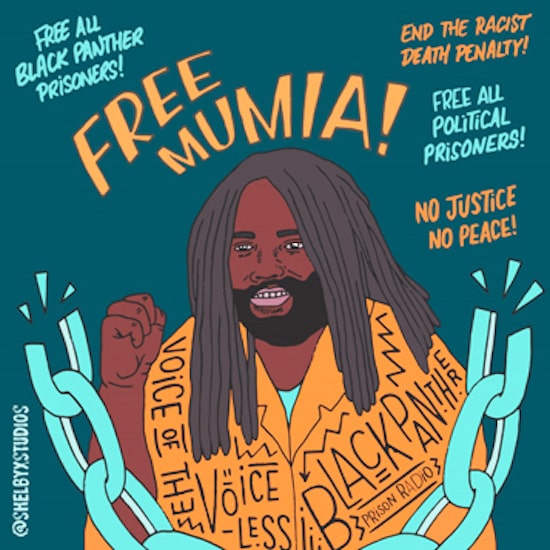
‘World renowned journalist. Former Black Panther. Political activist. Political prisoner. One of our foremost teachers.’ These are some of the ways Mumia Abu-Jamal was introduced at the November 2020 Freedom and Abolition press conference. Mumia’s case represents a decades-long systemic struggle against racist policing, the relentless US attack on black activists and a deep level of corruption within the Philadelphia police department. GRACE KRESS reports.
‘We’re in the midst of a movement that says Black Lives Matter, and if that’s truly the case, then it means that Mumia’s life and legacy must matter.’ – Colin Kaepernick
Why is Mumia in prison?
Wrongfully convicted of the 1981 killing of a white police officer, Mumia was sentenced to death in 1982. Prior to his arrest Mumia was a target of COINTELPRO, a series of FBI covert and illegal projects aimed at disrupting and derailing the activities of political activists.
From the outset the prosecution was beset with racism, coercion and corruption. The key witness has since retracted her statement, saying she was threatened with jail time if she didn’t name Mumia as the perpetrator, while other witnesses were paid off. Black jurors were unlawfully removed and journalists who reported on the case investigated by the police. The judge, Albert Sabo, was overheard saying: ‘I’m gonna help ’em fry the n*****.’ All this against the backdrop of a city administration which four years later in 1985 would bomb its own citizens, killing 11 people, including five children and destroying 61 homes. Those killed were members of MOVE, a Black liberation organisation.
Despite his imprisonment, Mumia, a long-time MOVE supporter, used his voice to shout out against this state bombing, and he continues to use his incredible skill for narrative to report on injustices across the globe, linking them to the same systems of oppression that keep him behind bars.
We must continue to fight for Mumia’s freedom
In 2011, 30 years into his time on death row, Mumia’s death sentence was revised to life without parole. In 2019, the discovery of new evidence meant his case was found to merit a new trial, which is yet to take place. Meanwhile, Mumia, now aged 66 and suffering from diabetes and hepatitis, has had to battle for appropriate medical care against state authorities which withheld treatment against their own doctors’ advice.
The fight to free Mumia is as urgent as it has always been. It was campaigning that got him taken off Death Row and an international movement that ensured he got access to the medical treatment he needed in 2016. That same energy is now needed to free him from prison.
Bring Mumia home!
Build communities not cages!
Listen to Mumia’s broadcasts at https://www.prisonradio.org/ and join the campaign to free him and all political prisoners.
* A series of essays was released by Kaepernick’s publishing company in October 2020 entitled Abolition for the People: the Movement for a Future Without Policing & Prisons.




